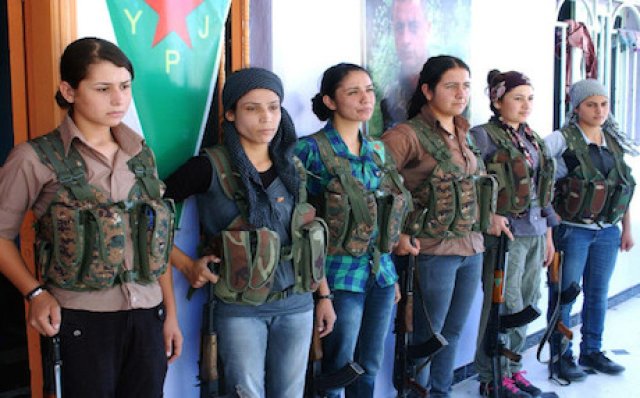
Kobane’s epic resistance against the assault of the genocidal Islamic State (IS) gangs had entered its fourth week by October 10.
The defence had held out against overwhelming odds. The defenders had been forced back, but their lines had not been broken. In some neighbourhoods, street fighting was taking place.
The prolonged, unyielding resistance — especially the heavy frontline involvement of women — has won admiration and inspired people around the world. It has forced the world’s media to cover the drama of Kobane and to report the solidarity mobilisation of the Kurdish people in Turkey and abroad.
The IS forces — and the Turkish government that backs them — miscalculated. They expected Kobane to fall within a week or so. Every day the resistance holds out increases the pressure on Turkey and the imperialist powers.
People are raising many questions. Why is the bombing of the US-led coalition so limited and ineffective around Kobane? Why is the US not coordinating with the YPG (People’s Protection Units) and YPJ (Women’s Protection Units) in the city?
Why are the Western powers not sending heavy weapons to enable the defenders to effectively counter the tanks, artillery and rocket launchers of the IS gangs?
The truth is that while the Islamic State is a problem for Washington and its allies, a democratic, self-governing, Kurdish-majority area in northern Syria is a far bigger problem for them and they simply do not want it to succeed.
However, the refusal of the US and its allies to seriously help Kobane comes with a heavy political price. What is all their talk about fighting terrorism worth when the West will not help the people defending Kobane with such inspiring courage and determination?
The Turkish government’s rotten role is now being exposed. Its active support for the IS gangs and its refusal to help Kobane is becoming clearer by the day. It has completely blocked the movement across the border into Kobane of either people or supplies — let alone weapons and ammunition.
Mass anti-government protests have erupted in dozens of Kurdish cities and towns across Turkey as well as in Ankara and Istanbul. They have been attacked by the police and army. In some places, IS sympathisers have also attacked the protests. By October 10, 22 people had been killed.
The Turkish army has been sent in to enforce a curfew in major cities. Diyarbakir (with 1.5 million people, the largest Kurdish city), Mardin and Van now have troops and tanks patrolling the streets.
In cities across Europe, Kurds have rallied in support of Kobane and against the IS and Turkey’s role.
In response to criticism of his failure to help Kobane, Turkish President Recip Tayyip Erdogan told reporters on October 4: “For us, the PKK is the same as ISIL. It is wrong to consider them as different from each other.”
The PKK (Kurdistan Workers Party) has led a decades-long struggle for Kurdish rights in Turkey. Since March last year, it has halted armed operations against government forces.
Its longtime leader, Abdullah Ocalan, is serving a life sentence in a Turkish prison. The PKK is on US, EU and Australian “terrorist” lists.
The Democratic Union Party (PYD) is the dominant party in Rojava — the Kurdish liberated zone in Syria of which Kobane is a part. It has close ties to the PKK and has a similar outlook.
However, it is an independent group. The Turkish rulers hate it for the same reason they hate the PKK: It is fighting for Kurdish rights. Erdogan and his gang of Islamic neoliberals hate the system of popular power which the PYD has championed in Rojava.
The problem with Erdogan’s current line on the PKK is that the Turkish government is supposedly negotiating with Ocalan and the PKK to achieve some sort of resolution of the Kurdish question. It now appears that the government has been negotiating with “terrorists”.
Does Erdogan really want to make progress on the Kurdish issue, which has blighted modern Turkey for its entire history? Ocalan and other Kurdish leaders have repeatedly warned that if Kobane falls and there is a massacre, any negotiations will be finished.
On October 4, PYD co-chair Saleh Muslim met with officials from Turkish military intelligence in Ankara to request aid. He was told this would only be available if the Kurdish forces joined the Free Syrian Army and focused on toppling Syrian dictator Bashar al-Assad, distanced themselves from the PKK, abandoned their claim to self-government, and agreed to a Turkish buffer zone inside Syria.
Rojava is opposed to the Assad regime and its relations with the Syrian opposition forces have been determined by whether or not they will accept Kurdish autonomy. In a number of places, the YPG has alliances with the FSA and some FSA units are in Kobane helping to defend the city.
Muslim’s encounter shows that the Turkish rulers refuse to accept Kurdish advances either in Syria or Turkey.
Kobane’s fate is not yet settled. Despite everything, the heroic defenders may yet prevail.
An October 9 Press TV report said: “Kurdish fighters in Syria’s border town of Kobane are getting the upper hand as urban warfare rages on between them and the ISIL Takfiri [fundamentalist] terrorists.
“According to reports on Wednesday, the Kurdish fighters, who know the battlefield in the area much better than the Takfiris, have driven the militants out of several areas in the southern part of the strategic town.
“Mustafa Ebdi, a Kurdish journalist and activist from Kobane, stated in a message posted on Facebook that the streets of the Maqtala neighborhood in southeastern Kobani are full of the bodies of ISIL terrorists.”
Kobane’s defenders have vowed to fight to the end. The Kurdish people in Turkey are rising up. They need active solidarity from left and progressive forces around the world.
Like the article? Subscribe to Green Left now! You can also like us on Facebook and follow us on Twitter.